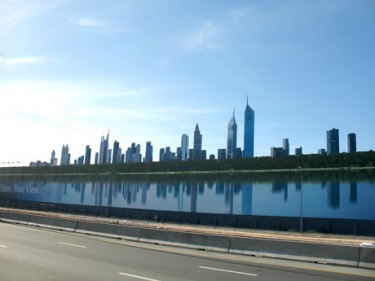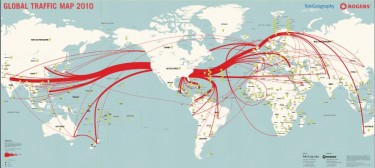A group of European telecommunications companies has made a proposal for global Internet regulation that could fundamentally alter the free flow of information online. In the process, they have highlighted the risks inherent in the broader debate over “Internet governance.”
The International Telecommunication Union (ITU), a specialized UN agency that sets standards for international telephony, is renegotiating one of its foundational treaties. Written in 1988, the current treaty does not address Internet-related issues. Several member states and corporate sector members of the ITU are proposing changes that would expand the agency’s regulatory authority to the Internet. Members states have made proposals regarding IP routing, cybersecurity, data protection, peering charges, and other areas that could affect Internet functionality and openness.

Dubai, where the ITU Conference will be held. Image by Wael Attili, labeled for reuse.
A proposal put forth by the European Telecommunications Network Operators’ association (ETNO) could undermine the free flow of online content worldwide. It could have particularly harmful effects on less developed countries and smaller content providers. Under the ETNO plan:
1. Network operators could be forced into a system for exchanging Internet traffic in which, when forwarding a communication to another network, they would have to pay a fee to the next network in the chain. Remember: the Internet is a network of networks. This would upend the current system, where network operators exchange much traffic free of charge.
2. Online hosts and content providers could be included in the interconnection fee system and be required to pay a fee for delivery of their content.
3. Internet Service Providers (ISPs) and network operators would develop a two-tiered system for online traffic, in which content providers could pay extra money to have their traffic sent with a guaranteed “quality of service.” Content providers who couldn’t afford the extra cost would have their content delivered by the traditional method, known as “best effort” delivery.
These elements of the ETNO proposal would increase revenues for telecommunications operators, but there is no guarantee that they would provide a benefit to users – in fact, they could do the opposite.

Global Internet traffic map. Labeled for reuse. Posted by Martin Irvine.
Disadvantaging Users in Less-Developed Countries
Under the ETNO proposal, networks in more developed countries may decide not to route traffic through countries that they believe are not big enough or commercially important enough to justify the additional cost. This policy could leave users in certain countries on the wrong side of a widening “digital divide.” And it could make it hard for those users to access important content outside their countriesʼ borders.
If networks in less-developed countries need to pay new interconnection fees for sending Internet traffic, they may have to charge more to their users. This could leave entrepreneurs and other content providers in less developed countries facing greater costs in accessing global markets.
Disadvantaging Small and Independent Content Creators
Under ETNOʼs proposal, online service providers, ranging from small blogs to large social networking sites, would have to pay significant fees in order to send traffic through the network. Large, established companies that host content could probably afford these fees, but for smaller companies – many of which host independent content or innovative services – such costs could limit their global reach.
Web content providers in less developed countries would be disproportionately burdened by these fees, and thus less able to make their content available at a regional or international level. In poorer countries with low Internet penetration rates, this could leave users with access to local websites and content delivered by Internet giants like Google, but little else.
To use Global Voices as an example, Spain-based authors covering Latin America might suddenly have limited access to blogs in small, less developed countries like El Salvador or Bolivia, where bloggers would likely have limited means to pay international interconnection fees. On the whole, small and/or independent websites all over the world would become less accessible at the international level; international connections between users who create, innovate, game, or interact across borders would suddenly begin to diminish.
Economic Impact
The proposal has been framed as a policy that will allow telecommunications companies to make greater investments in Internet infrastructure and increasing ICT access, but there is no guarantee that additional revenues would be put towards such development. Instead, the policy could undermine the economic development potential of the Internet for businesses and independent vendors in developing countries. Small businesses wanting to sell their products on the global market would face higher costs, and they could even find it difficult to reach the e-commerce sites that serve as platforms for small enterprise.
Threat to Net Neutrality
Under ETNOʼs proposal, network operators could opt to prioritize certain traffic. A company could pay the operator higher fees in order to have its traffic prioritized, and thus delivered more quickly and reliably than that of its competitors. This would give network operators tremendous power, and it would undermine the principle of Internet neutrality.
What’s Next – And What Internet Users Can Do
ITU members will meet to vote on this and many other proposals this December in Dubai at the World Conference on International Telecommunications. The ITU is not open to civil society participation. Only governments and dues-paying “sector members” (mainly large companies and trade associations) can participate.
The best way for Internet users to voice their concerns about this issue is by working through the national delegations that their governments will send to the conference. Usually, these national delegations are comprised of the minister and staff of the national telecommunications ministry. Civil society groups have been urging Member States of the ITU to conduct public processes at the national level to solicit input from all relevant stakeholders and to release their national positions and proposals for public debate.
Global Voices Advocacy will soon post further information about how concerned citizens can voice their opinions about the treaty and its effects on the Internet. Netizens can learn more about the ITU and its potential impact on the Internet by visiting resources pages created by the Center for Democracy and Technology (CDT) and Public Knowledge. To learn more about the ETNO proposal in particular and its implications for the open Internet, read CDT’s memo on the proposal.




13 comments
Links for 2012-07-27 [del.icio.us]…
European Telco Proposal to ITU: A Threat to the Open Web? – Global Voices Advocacy European Telco Proposal…
Lesestoff…
Dieser Artikel ist auch verfügbar auf: Englisch: Recommended Reading * Online traceability: Who did that? (27.07.2012) lightbluetouchpaper.org consumerfocus.org.uk * European Telco Proposal to ITU: A Threat to the Open Web? (27.07.2012)…